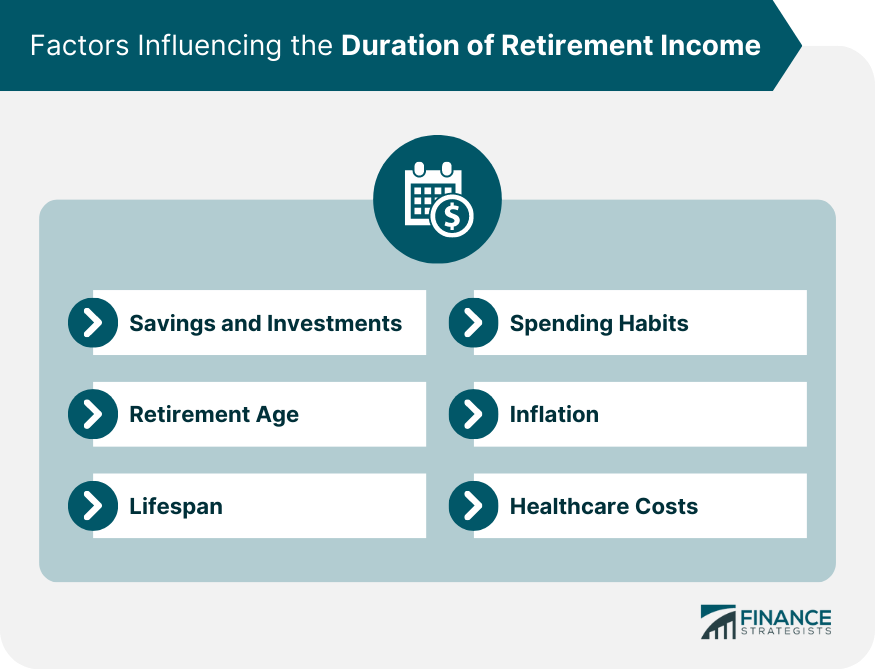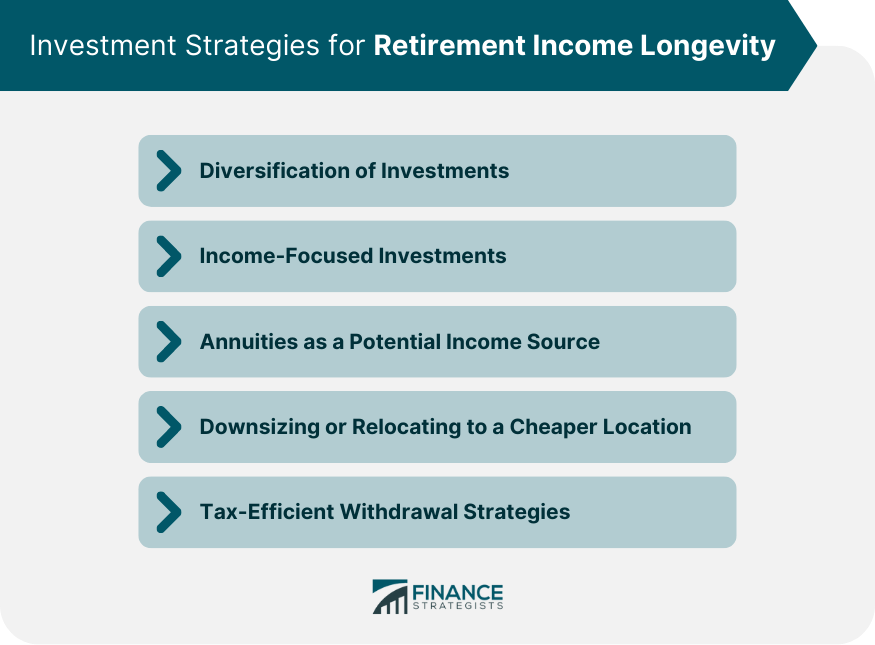Retirement income longevity refers to the length of time that retirement savings and income sources can sustain an individual or couple throughout their retirement years. It is a crucial consideration for anyone planning for retirement, as it determines the financial security and stability during this phase of life. Understanding the factors that impact the duration of retirement income is essential for making informed decisions and developing effective strategies to ensure a comfortable and worry-free retirement. Several key factors can directly influence the duration of your retirement income. These include your savings and investments, the age at which you choose to retire, your expected lifespan, spending habits, inflation, and potential healthcare costs. The amount you've saved and where it's invested will greatly affect the longevity of your retirement income. Those with robust investment portfolios tend to have a more secure retirement income stream. The age at which you retire influences how long your retirement income needs to last. Retiring at 65 means your retirement income should ideally last 20-30 years, given the average lifespan. Advances in healthcare mean people are living longer. As such, planning your retirement income should take into account the potential for a longer-than-average lifespan. Your lifestyle choices and cost of living can significantly impact how long your retirement income lasts. A frugal lifestyle can make your income stretch further than a lifestyle characterized by lavish spending. The devaluation of money over time is another important factor to consider. What might seem like a comfortable income now may not be sufficient in a few years due to rising prices. Unexpected health expenses can quickly drain retirement income. Having a plan for potential health issues is crucial in maintaining your financial stability during retirement. A critical part of retirement planning is estimating how long your income will last. Several financial strategies and tools can help in this process. Understanding various financial strategies is a key step towards ensuring your retirement income lasts as long as you need it to. The 4% Rule: This rule suggests withdrawing 4% of your retirement savings in the first year of retirement, then adjusting the amount each year for inflation. Delaying Social Security Benefits: If you can afford to do so, delaying your social security benefits can significantly boost your retirement income. Creating a Retirement Budget: This helps in identifying how much you'll need to sustain your lifestyle in retirement, enabling better planning of your income. Retirement income calculators are useful tools that can help determine how long your retirement income will last. They typically account for factors such as current savings, annual contributions, investment returns, and your retirement spending estimate. However, their accuracy depends on the information you input, and they might not account for unexpected events like healthcare emergencies or major lifestyle changes. Therefore, they should be used as a guide rather than a definitive prediction. Financial advisors can offer personalized advice tailored to your circumstances. They can help evaluate your financial position, project retirement income needs, and advise on suitable strategies to maximize your retirement income. A well-diversified portfolio can spread risk and potentially increase returns over time. This can be achieved by investing in a mix of assets, such as stocks, bonds, and real estate. Certain investments, like dividend-paying stocks or bonds, can provide a steady stream of income during retirement. Annuities can provide a guaranteed income stream for a set period or for life, depending on the contract. While they may offer stability, it's important to consider factors like fees, the financial strength of the insurance company, and the potential for inflation. Downsizing your home or moving to a more affordable location can significantly reduce living expenses and help stretch your retirement income. Understanding which accounts to withdraw from first can make a significant difference in the longevity of your retirement income. Traditional IRA and 401(k) withdrawals are taxed as regular income, while Roth IRA withdrawals are tax-free. Coordinating withdrawals strategically can reduce the overall tax burden and prolong the lifespan of your retirement savings. Unexpected events can significantly impact the duration of your retirement income. Proper planning can help mitigate such risks. Long-Term Care Insurance: This can cover the cost of care not covered by health insurance, Medicare, or Medicaid, such as services for those with chronic medical conditions or disability. Health Insurance: Especially in your older years, healthcare costs can be significant. Having a good health insurance policy is crucial to prevent these costs from depleting your retirement savings. An emergency fund acts as a financial safety net for unexpected expenses. This fund should ideally cover three to six months' worth of living expenses. Proper estate planning can help protect your assets and ensure they are distributed according to your wishes after your death. This involves creating a will, designating beneficiaries, and possibly setting up trusts. Navigating the complexities of retirement income requires understanding the diverse factors that influence its duration. The amount of savings and investments, retirement age, expected lifespan, lifestyle, inflation, and unforeseen healthcare costs all play integral roles. Maximizing retirement income necessitates strategic financial planning, including diversification of investments, considering annuities, and utilizing tax-efficient withdrawal methods. Tools like retirement calculators, coupled with the guidance of a financial advisor, can assist in estimating the longevity of your income. Additionally, planning for unexpected events is paramount, emphasizing the need for comprehensive insurance and an emergency fund. A carefully orchestrated estate plan can also safeguard your assets for future generations. Ultimately, thorough and personalized planning can ensure your retirement income not only lasts but enables you to enjoy your retirement years in comfort and security.Understanding Retirement Income Longevity
Factors Influencing the Duration of Retirement Income
Savings and Investments
Retirement Age
Lifespan
Spending Habits
Inflation
Healthcare Costs

Estimating the Longevity of Retirement Income
Financial Strategies to Make Retirement Income Last
While this rule has been traditionally used as a guideline, it doesn't account for fluctuating market conditions or personal circumstances and should be used with discretion.Using Retirement Income Calculators
Working With a Financial Advisor
Investment Strategies for Retirement Income Longevity
Diversification of Investments
Income-Focused Investments
Annuities as a Potential Income Source
Downsizing or Relocating to a Cheaper Location
Tax-Efficient Withdrawal Strategies

Preparing for the Unexpected
Role of Insurance in Protecting Retirement Income
Having an Emergency Fund
Estate Planning
Conclusion
How Long Will Retirement Income Last? FAQs
The longevity of your retirement income depends on multiple factors, including the total amount saved, how those savings are invested, your withdrawal rate, and market conditions. Tools like retirement income calculators and professional advice from financial advisors can help estimate how long your income will last.
Key factors include your savings and investments, retirement age, expected lifespan, spending habits, inflation rate, and potential healthcare costs. By understanding and effectively managing these factors, you can help ensure the longevity of your retirement income.
Strategies to prolong retirement income include diversifying investments, considering annuities, employing tax-efficient withdrawal strategies, downsizing or moving to cheaper locations, and having a robust insurance plan to cover unexpected costs.
Retirement income calculators can give a rough estimate. You can also work with a financial advisor who can provide a personalized assessment considering your financial position and retirement goals.
Preparation strategies include maintaining an emergency fund, having comprehensive insurance (like long-term care and health insurance), and having a solid estate plan. These steps can help protect your retirement income from unforeseen expenses.
True Tamplin is a published author, public speaker, CEO of UpDigital, and founder of Finance Strategists.
True is a Certified Educator in Personal Finance (CEPF®), author of The Handy Financial Ratios Guide, a member of the Society for Advancing Business Editing and Writing, contributes to his financial education site, Finance Strategists, and has spoken to various financial communities such as the CFA Institute, as well as university students like his Alma mater, Biola University, where he received a bachelor of science in business and data analytics.
To learn more about True, visit his personal website or view his author profiles on Amazon, Nasdaq and Forbes.











